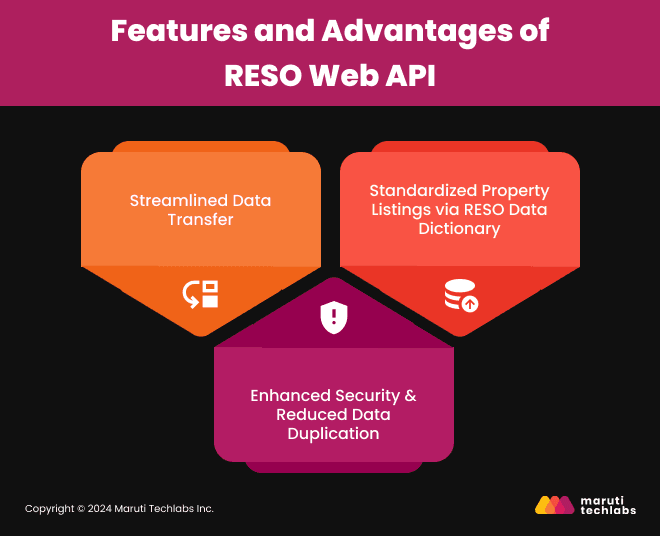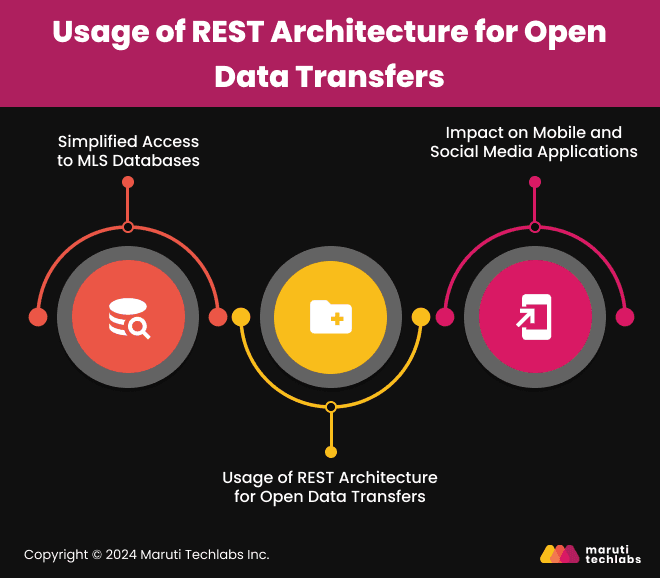

Everything You Wanted to Know About The RESO WEB API






The real estate sector has traditionally faced challenges with varied data formats, intricate integration procedures, and inefficiencies in cross-platform data sharing. For brokers, professionals, and developers, this often means spending more time on data management than client service and business growth.
According to Deloitte’s 2025 Commercial Real Estate Outlook, 81% of industry professionals identified data and technology as their primary focus for spending in the coming year. This growing emphasis highlights the importance of data management in optimizing business operations.
As technology advances, a standardized solution for data exchange is more important than ever. The RESO Web API offers a streamlined way for real estate systems to share data seamlessly, helping developers build applications and brokers manage listings more efficiently.
In this guide, we’ll explore how the RESO Web API transforms data management in real estate and why adopting this standard is essential.
The RESO Web API is a standardized method for accessing and exchanging real estate data developed by the Real Estate Standards Organization (RESO). It simplifies how real estate systems communicate, providing a common language for software platforms to share data quickly and efficiently. By modernizing data exchange, the RESO Web API helps real estate professionals, developers, and tech teams streamline their operations and access accurate, real-time information.
Understanding the RESO Web API is just the beginning. Here’s why RESO standards are crucial for the real estate industry’s growth and efficiency.
In a data-driven industry like real estate, uniformity in how data is exchanged and accessed is critical. Historically, differences in data formats caused friction, leading to inconsistencies, errors, and delayed transactions. When systems can’t read or process each other’s data properly, it creates barriers that slow down transactions, limit opportunities, and reduce overall efficiency.
The RESO standards have been developed to address this problem. RESO institutes a common way to exchange data between systems, eliminating the problems created by various formats, which can make things confusing for systems. This reduces the chances of error and enables the easy combination of several systems, thus speeding up transactions.
Furthermore, RESO standards solve the problem of fast data exchange and support businesses in compliance with the legal and regulatory data use standards. Since the rules regarding data collection, storage, processing, and sharing are becoming more rigorous, compliance has become a major issue for real estate companies. Incorporating RESO standards enables organizations to meet these legal necessities and prevents them from being victims of compliance difficulties.
Having established the importance of RESO standards, the RESO Web API has quickly become the gold standard for real estate data exchange, setting a new benchmark for performance and seamless integration across platforms.
For years, the Real Estate Transaction Standard (RETS) was the go-to method for data exchange. However, as technology advanced, RETS showed signs of strain under the growing demands of the modern real estate ecosystem.
For over a decade, RETS was the backbone of real estate data exchange, enabling Multiple Listing Services (MLS) and real estate platforms to share information. However, as the industry expanded, RETS struggled to keep pace with the evolving industry. Its reliance on outdated technologies and rigid data formats made it ill-suited for managing the growing volume of real-time data. As a result, businesses faced challenges in keeping up with rapidly changing market demands.
To overcome the shortcomings of RETS, the RESO Web API was introduced. Unlike RETS, which relied on older technologies, the RESO Web API uses modern, flexible standards such as RESTful APIs and JSON, enabling faster and more efficient data exchange. This shift ensures better scalability, real-time data access, and easier integration with other systems, making it a more suitable solution for the evolving real estate market.
Here are the key differences between RETS and the RESO Web API:
Feature | RETS | RESO Web API |
Technology | Built on outdated protocols (HTTP, XML). | Modern RESTful API with JSON. |
Data Format | Primarily uses XML, a rigid and verbose format. | Uses JSON, a lightweight and flexible format.
|
Scalability | Limited scalability for handling large data volumes. | Highly scalable, designed for modern systems and large datasets. |
Real-Time Data Access | Requires batch processing and manual updates. | Supports real-time, instant data exchange.
|
Integration
| Difficult to integrate with newer technologies.
| Easy integration with modern platforms and services. |
Security | Basic security features and limited flexibility. | Enhanced security with OAuth and modern encryption standards. |
Performance | Slower data exchange and processing. | Faster, more efficient data access and sharing. |
Compliance & Flexibility | Less flexible in terms of regulatory updates. | Compliant with the latest standards and data governance requirements. |
User Friendliness | Requires more technical expertise for setup and use. | Easier to use with well-documented APIs and developer tools. |
Below are some key features and advantages of the RESO Web API that reshapes the real estate industry.
The RESO Web API offers a modern approach to real estate data exchange. It simplifies data transfer and enhances overall efficiency.

Some of its main attributes and benefits are listed below:
RESO Web API reduces the need for local database hosting by enabling seamless, real-time data transfer across platforms. This makes it easier for businesses to access the latest listings and market data without relying on outdated or siloed systems.
The RESO Data Dictionary ensures that all property listings follow a consistent format, making data exchange smoother and more reliable. This eliminates the confusion caused by different systems using different data formats.
Security is a top priority with the RESO Web API. The system limits data duplication, which reduces the risk of errors and unauthorized access. It also minimizes the need for complex coding, making it more secure and cost-effective for real estate businesses.
We’ve covered the benefits and capabilities of the RESO Web API. It’s time to explore how it functions and interacts with the modern real estate marketplace.

Let’s take a look at how the RESO Web API works and integrates seamlessly into the real estate ecosystem.
The RESO Web API offers simplified access to MLS databases previously linked to individual websites. This integration provides greater flexibility, allowing real estate platforms to connect seamlessly with various systems and update listings in real-time.
The RESO Web API uses RESTful architecture to facilitate open, seamless data flows. This eliminates the need for intricate scripting or interfaces and guarantees that real estate data is consistently accessible across platforms by allowing it to move freely across systems.
The RESO Web API also significantly impacts mobile apps and social media platforms. Real estate systems may give consumers real-time updates immediately by giving them simple access to current, standardized property data, which enhances user experience and engagement.
After discussing the operation of the RESO Web API's operation, we now focus on how the industry is moving to embrace this cutting-edge data standard.
With the widespread adoption of the RESO Web API, the real estate industry is shifting toward a more efficient, standardized data exchange. As a result of this shift, the handling of MLS (Multiple Listing Service) data will change, offering improved integration, quicker access, and more accurate data.
Real estate professionals, MLS platforms, and technology providers are actively preparing for the widespread adoption of the RESO Web API. Key industry players are updating their systems to ensure compatibility with this modern standard, enabling seamless data access and exchange across platforms.
MLS providers are setting clear deadlines for transitioning from RETS (Real Estate Transaction Standard) to the RESO Web API. These timelines allow businesses to plan accordingly and minimize disruptions, ensuring that real estate platforms and data sharing remain efficient as the industry switches.
As the industry moves forward, RETS will gradually be phased out, making way for the more efficient RESO Web API. Industry leaders are pushing for the full retirement of RETS, highlighting the Web API as the superior, future-proof standard for real estate data exchange. MLS platforms are already making the necessary adjustments to retire RETS, while software vendors are fully updating their tools and services to support the RESO Web API.
The RESO Web API represents a significant leap forward in how real estate professionals access, manage and share property data. It replaces outdated systems like RETS, streamlining integration, improving workflows, and enhancing collaboration with third-party applications. This modern solution empowers businesses to manage large-scale data more easily, ensuring consistency, minimizing errors, and allowing for real-time data exchange across platforms.
As the real estate industry accelerates toward fully adopting the RESO Web API, businesses can maintain a competitive edge by implementing this advanced solution. At Maruti Techlabs, we specialize in guiding companies through the complexities of integrating cutting-edge technology solutions. Whether you need help integrating the RESO Web API or want a custom-built solution, our team is ready to assist.
Our experience ensures your systems are secure, scalable, effective, and adhere to legal technology standards. We prioritize protecting your company from possible threats while adhering to the strictest regulatory requirements because we recognize the importance of data security and compliance.
Take the next step toward transforming your real estate business. Contact Maruti Techlabs today, and let us build secure, efficient, and compliant solutions tailored to your business needs!
As a leader in software development in Chicago, we bring local expertise and global insights to every project we deliver.
1. How does the RESO Web API benefit my real estate business?
Adopting the RESO Web API allows your real estate business to integrate seamlessly with third-party platforms and MLS databases, improve data accuracy, and enhance scalability. It also simplifies workflows by providing real-time data access and streamlining system communication.
2. What are the key differences between RETS and the RESO Web API?
The Real Estate Transaction Standard (RETS) is an older data exchange protocol with limitations, including scalability issues, security concerns, and lack of real-time access. In contrast, the RESO Web API uses a modern REST architecture and JSON for faster, more secure data communication, offering real-time access and better integration with other systems.
3. Can RESO Web API improve my mobile app and social media platforms?
Yes, you may update your mobile applications and social media platforms with real-time property information thanks to the RESO Web API. Customers may interact with the content on their devices when accurate and current listings are delivered, improving overall user experience.
4. What security measures does the RESO Web API have?
The RESO Web API is designed with security in mind, using secure HTTPS protocols to protect data in transit. Additionally, it reduces risks by minimizing data duplication and limiting access to sensitive information. If your business deals with legal data requirements, implementing the RESO Web API ensures compliance with industry standards and helps you meet security and compliance obligations in legal tech.
5. How quickly can I transition from RETS to the RESO Web API?
Depending on your current system configuration, you can switch from RETS to RESO Web API. Businesses may need to set aside time for planning and execution even if the API is made for simple integration. The switch can be performed swiftly and effectively with the correct direction and knowledge, guaranteeing your company won’t be disrupted.


